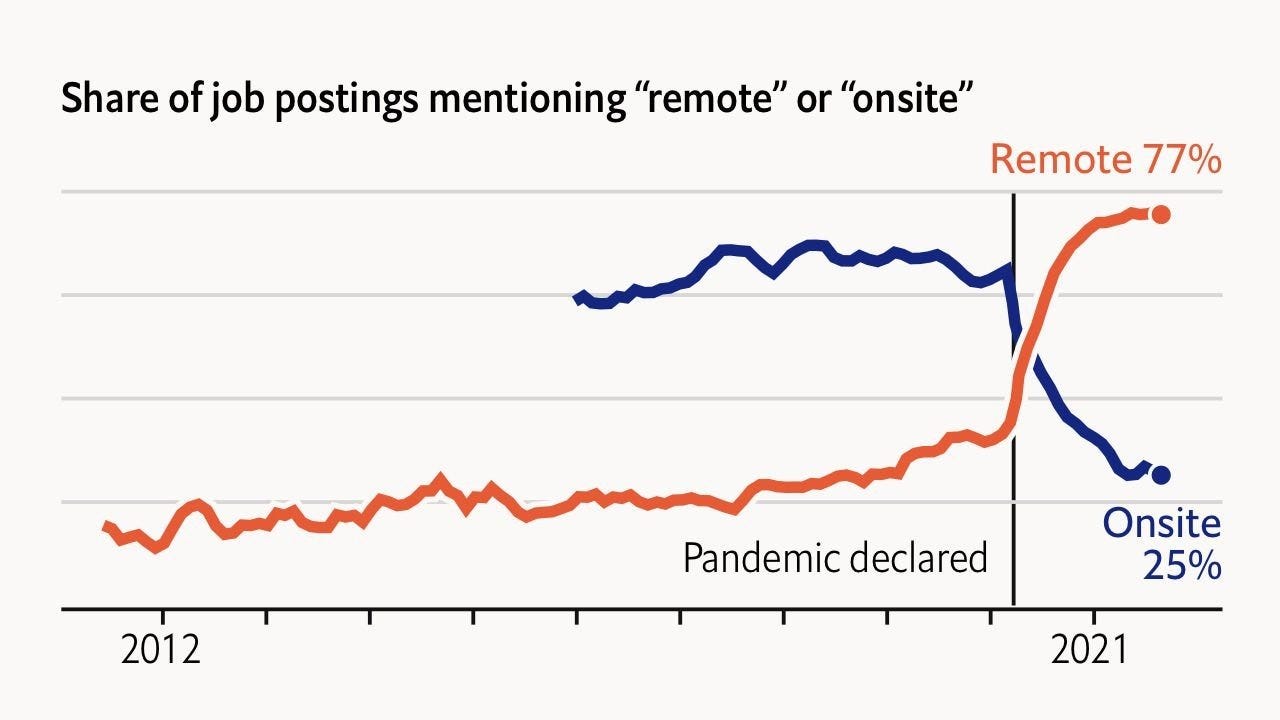Ethereum is the Metaverse
"The future is already here, it's just not evenly distributed" - William Gibson
As with any nascent technology, and particularly those that are inextricably intertwined with the changing cultural landscape, there is currently a lot of disagreement over the semantics of exactly what the '“metaverse” is and how to describe it for the layman. As more parties throw their hats into the ring under the umbrella of this buzzword, it can become even more difficult to understand the innovation due to the inherent incentives associated with dominating the “metaverse” branding with marketing; many people expected the metaverse to be a decentralised phenomenon associated with virtual worlds such as Decentraland, and were thus somewhat disgruntled to discover that companies with particularly nefarious reputations, such as Facebook and Microsoft, also have plans to invest billions into what many now fear will instead become a big tech dystopia.
The term “metaverse” was originally coined in Neal Stephenson’s 1992 science fiction novel Snow Crash. In the story, humans took on the roles of programmable avatars and came to interact with one another in a three dimensional virtual space, which comprised virtual real estate which could be bought and sold from the Global Multimedia Protocol Group, as well as developed upon. Despite some of the technological limitations that would have been difficult to foresee at the time, but to a modern audience would seem obvious and the potential limitations arbitrary, Stephenson’s vision is eerily similar to how one may imagine a modern-day manifestation of current virtual worlds. In Decentraland, the first large virtual world to gain traction, users are also able to buy and sell land $LAND (each plot represented by an NFT) with Decentraland’s native token $MANA, on the Ethereum blockchain.
Built alongside the ideals of decentralisation as a means for creating a more utilitarian society that can iron-out many of the consternations that one would associate with the physical world, the idea of Decentraland is that the entire world is owned by its users, with property rights enforced by the blockchain and a digital economy booming within the space.
Although institutional involvement is something that many Bitcoiners have been hoping for as a means to elevate prices, the involvement of big tech oligopolies has more sinister implications when one considers how contradictory it is with the utopian ideals of decentralisation. The overwhelming majority of people don’t trust Zuckerburg with their personal data, and are not comfortable with the idea of living in an opaque artificial world that he oversees. The same applies for almost all other big tech companies, who have all had their share of controversy around privacy and data protection. Moreover, the idea of such tremendous power being so concentrated, as was potentially the case with Facebook’s failed “Libra” experimentation, ought to be a consternation for everyone: deferring not only your data and social experience Facebook, but also your financial history, is something that ought to be avoided at all costs - the stakes are simply too high, and they need not be when there are so many viable alternatives that more appropriately align with the requirements and desires of the user.
In the 1450s, Johannes Gutenberg made history by printing the Gutenberg Bible, which ushered in a new era of information sharing: oral traditions were gradually obsoleted thanks to the printing press and the physical manifestation of data ensured that it became stronger and more difficult to corrupt. Many Gutenberg bibles still exist today, and are revered for kicking off the Gutenberg Revolution. During The Mobile Wave, many goods and services were dematerialised from the physical world into the digital world - in turn they were also made stronger and more efficient. Maps were dematerialised into SatNavs and Google Maps (which is not only more difficult to destroy than an A-Z, but can give you personalised directions each step of the way). Alarm clocks were dematerialised into applications within handheld devices, letters and carrier pigeons into Emails, many social scenarios into social media, and libraries were dematerialised into Google. Bitcoin is in the process of dematerialising a store of value in which someone can preserve their purchasing power over the long term without all the complications associated with real estate and bars of gold.
The promise of the metaverse is manyfold, and for many the aforementioned descriptions of such virtual reality are something to aspire towards; the idea of escaping reality in favour of such a detached existence inevitably appeals to a large segment of society, largely comprised of the socially-inept, a segment which undoubtedly grew in size as a consequence of the isolation imposed by lockdown policies worldwide. However, the steps that the metaverse takes in terms of dematerialising many other aspects of the human experience, including work and leisure, is not confined to virtual reality, neither is it a dystopian force that further isolates people from one another. In Web 2.0 it did become possible for some work to occur remotely, and the percentage of remote workers was on the rise before the pandemic was announced, but lockdown policies acted as a catalyst without which the culture would have developed less erratically in favour of abandoning the traditional.
-Source: The Economist
Ethereum, and smart contract platforms, act as a further catalyst that enables work to happen remotely, and to change the nature of work itself. Many businesses, even those working in software, IT, and other forms of technology, face many barriers when it comes to working remotely. The most significant of these is trust: an employer wants to be certain that they are paying a fair salary for the amount of hours that an employee is working. Just as social media platforms like Facebook and Twitter allowed society to engage in social interactions digitally (something that has been expanded by Zoom), and YouTube allowed for the democratisation of content creation, so too will the metaverse allow anyone to work remotely. The barrier to entry has been falling with each passing year, as Internet becomes more widely-spread and the growing digital economy requires evermore niche talents and skills. Fiverr is a good example of a way in which this remote work for graphic designers has already been changing, and a perfect case study into what the changing nature of work means.
In the cryptosphere, there are a litany of projects for which one can work remotely. In fact, the aforementioned dematerialisation of traditional workplaces means that corporate offices are soon to become a thing of the past: working on-site for many DAOs is a near impossibility, for not only does it fly in the face of the ethos of decentralisation if there is a physical HQ, but it also excludes the meritocratic involvement and scaling that is not only possible digitally, but also a necessary prerequisite for cultivating an efficient hive-mind.
However, in order for such scaling to be achieved, it is not possible for all DAOs to pay each of their members a fixed salary and expect reasonable contribution. Since the whole purpose of decentralisation is that merits come in all shapes and forms, it is illogical and irrational to take an approach of paying everyone equitably upfront. With few exceptions, in the traditional workplaces of Fiat World, once someone is hired they are typically remunerated for their input, rather than the subjective nature of their output, which is often difficult to quantify. In the digital realm, output is the only thing that can be measured, and as such becomes the only way in which one can be paid for their efforts. This comes with various positives and negatives, not least of which that people are incentivised to specialise more in their specific areas of expertise, and to ensure that what they produce is of high quality, regardless of how long it takes. There are some novel governance initiates underway in the DeFi arena to work on how to best leverage the collective hive-minds of DAOs: PieDAO was the first DAOs to implement a Vote-Escrowed governance token, in which one can opt to align themselves with the community by locking their tokens for up to three years, and as long as they participate in voting on governance proposals they are entitled to receive a proportional share of the DAO revenues.
All of this is indicative of a significant social change geared towards the changing nature of work, and the metaverse. Whilst many associate the concept with virtual reality and ethereal experiences dreamed up by Beepl, what the metaverse truly represents is the opportunity for one to take the reins, and to become involved in whatever interests them without any restrictions concerning geography, race, age, etc. Thanks to the possibility of working anonymously, and having your peers know you only by your avatar, people from all over the world are able to find one another to work together on what truly interests them - the fact that this doesn’t all play out on Sandbox or Decentraland is irrelevant. There is certainly a place for these sorts of virtual planets; Decentraland has become a very popular place to host NFT art collections digitally, and as the bandwidth improves, there are clear benefits for further inclusion of people who would otherwise have been disabled, but can instead liberate themselves from their physical handicaps by living anywhere they can imagine in a digital space.
-Beepl
In many ways, we are already living in the metaverse. Since the concept itself is still quite a nascent one, there is a lot of disagreement over exactly what a “metaverse” entails, but it is clear to me that it is more than just subjugating oneself to escapism through a headset and VR goggles - there is certainly more benefit to society than fostering and exacerbating a culture of social isolation. If anything, the opportunity for people all over the world to find like-minded people is a beautiful expansion of the human experience. Everyone can find their niches and do the things they love, without any pressure whatsoever for conformity. It may have been possible to build communities with Web 2.0, but the monetisation of them and the largely risk-minimised nature of this monetisation by virtue of smart contract platforms ensures that these communities are sustainable, inclusive, decentralised, and global. There are other smart contract platforms, but (for now at least) Ethereum is the clear king in the space.
This is significant, because the open-source nature of Ethereum means that anything and everything can be audited in real-time. Unlike the closed nature of Facebook (now known as Meta in an invidious attempt to distance themselves from a reputation of selling personal data, in favour of capitalising on a decentralised revolution that bears fuck all relevance to their company), Google, Apple, Netflix, etc., one can rest assured that distributed blockchains will not act exploitatively - and if they do, everyone will know instantly. The ideals of a meritocratic, fair and decentralised digital landscape are only possible with a foundation built on open-source smart contracts, and the good news is that this world already exists for those who wish to capitalise on it.




